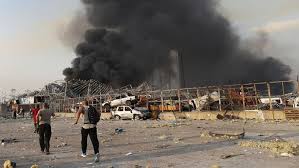Tow week ago on August 4, 2020, Lebanon shocked with two blasts that occurred in Beirut. The blast killed 180 victims when nearly 3,000 tonnes of ammonium nitrate exploded at Beirut’s port.
As cited News24xx.com from a statement by the Syrian embassy on August 8 said, 43 Syrians killed.
Here some stories from Syrian refugees that survived from the blast.
- Dima Steif
Dima Steif, a 16-year-old Syrian refugee from Idlib told that the blast that killed half of her family and makes her is still in shock. Now, Dima and her father have been temporarily staying at a hotel paid for by an aid organization.
The blast makes Dima has lost her mother Khaldi and her sisters named Latifa, 22-year-old and Jude, 13-year-old .
Dima told when the blast occurred, they were staying at home. “We were at home when suddenly we heard the first explosion. And suddenly, the next blow came and the whole earth shook underneath us.”
She can’t bring any stuff from her home after the roof had already collapsed.
Known that Dima’s family had come to Lebanon in 2014 after escaping the civil war in Syria and lived in Karantina, a poor Beirut neighborhood near the port.
- Fatima Abumaghara, 35,
Mrs. Fatima fled Aleppo with her family to Lebanon in 2013. Her husband worked at the port in offloading and loading cargo in Karantina.
Mrs. Fatima’s husband named Abdel Qader Balusso, 43 years old, died in the Beirut blast, makes her became a widow with four young children.
After his death, Fatima said she lost everything of meaning and her life was no longer worth living.
“Until the death of my husband, I lost everything. I felt my life was no longer. Everything is gone.” Fatima said.
Now, she should struggle with her life and also for her children, because before the blast, Fatima said her family has been the victim of discrimination since they moved to Lebanon.
She told, “Life in Lebanon has been difficult every day. My children are regularly bullied at school and humiliated by their neighbors. But, the blast was even worse than what we experienced in Syria.”
The head of communications at the UNHCR, Omer Elnaiem, said: “The Syrians were particularly affected by the incident. A lot of Syrians Others lived in Karantina. That’s why many died or were injured.”
As information, there are nearly one million registered Syrian refugees in Lebanon, having moved there since the start of the civil war in 2011. And at least 100 Syrian families have been severely impacted.
To help 100,000 people who affected by the blast, the UNHCR promised USD 35m
Elnaiem said, “They now need everything from food and medicine to home rehabilitation.”
to help, regardless of their nationality. But Syrian refugees and migrant workers remain more vulnerable than others, say aid organizations.
“Syrian refugees were already part of the most vulnerable sector in the Lebanese society,” said UNHCR’s Elnaeim.
But as cited from Aljazeera, although the Lebanese government promised to provide free hospital treatment to everyone affected by the explosion, many media reports indicated that some hospitals have refused to treat Syrian refugees.



